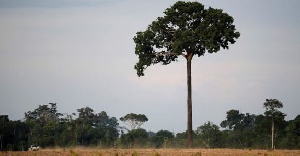 New regime proposes 60% benefit to farmers
New regime proposes 60% benefit to farmers
The Ghana REDD+ secretariat, from recent research, asserts that current agricultural activities account for about 50 percent of deforestation in the country.
Available statistics show that Ghana loses nearly three percent of its forest cover each year and almost all other trees outside of its forest reserves.
Experts in this area have indicated that government, over the years, decide to protect only forest reserve and not forest cover, which means leaving areas outside forest reserves for other land use options such as agriculture, which contributes the afore estimated 50 percent to deforestation.
At a time, Ghana had eight million hectares of forest but just about 1.8 million were reserved for permanent forestry; of the reserved area too, some have now been converted to cocoa farming.
Ghana REDD+ secretariat further notes that the newly proposed tree tenure regime will avert this trend as farmers will be enticed and encouraged to keep and nurture economically viable trees on their farm lands, Mr. Obed Owusu-Addai, a Campaigner at EcoCare Ghana has indicated.
In a media workshop organised by Friends of the Earth (FoE) Ghana, Owusu-Addai said that the newly proposed regime, when passed into law, will ensure that, of the benefits derived from tress harvested from off-reserved areas, farmers receive 60 percent of the economic value of the tree.
In the current regime, farmers are sidelined in the benefit sharing after these economically valuable trees have being nurtured and harvested from their farmlands.
Farmers currently get compensated for only the crops that have been destroyed on their farms.
Due to this existing arrangement, Owusu-Addai opined that farmers are unwilling to leave trees on their farmers.
He was quick to note that the government had taken steps to address the challenge to allow farmers to benefit from trees they nurtured on their lands as identified in the newly proposed benefit sharing.
In May 2018, key actors in the global struggle against deforestation gathered for the Tropical Forest Alliance 2020 General Assembly in Ghana to take stock and accelerate action on their commitments.
While the 2020 deadline is fast approaching, new spaces for private sector-civil society collaboration, on-going tenure reforms and encouraging pilot projects indicate the potential to ramp up corporate progress toward reducing deforestation and respecting community land rights.
Owusu-Addai indicated that there is the need to ensure equitable, efficient, and effective distribution of the proceeds generated from the sale of timbers.